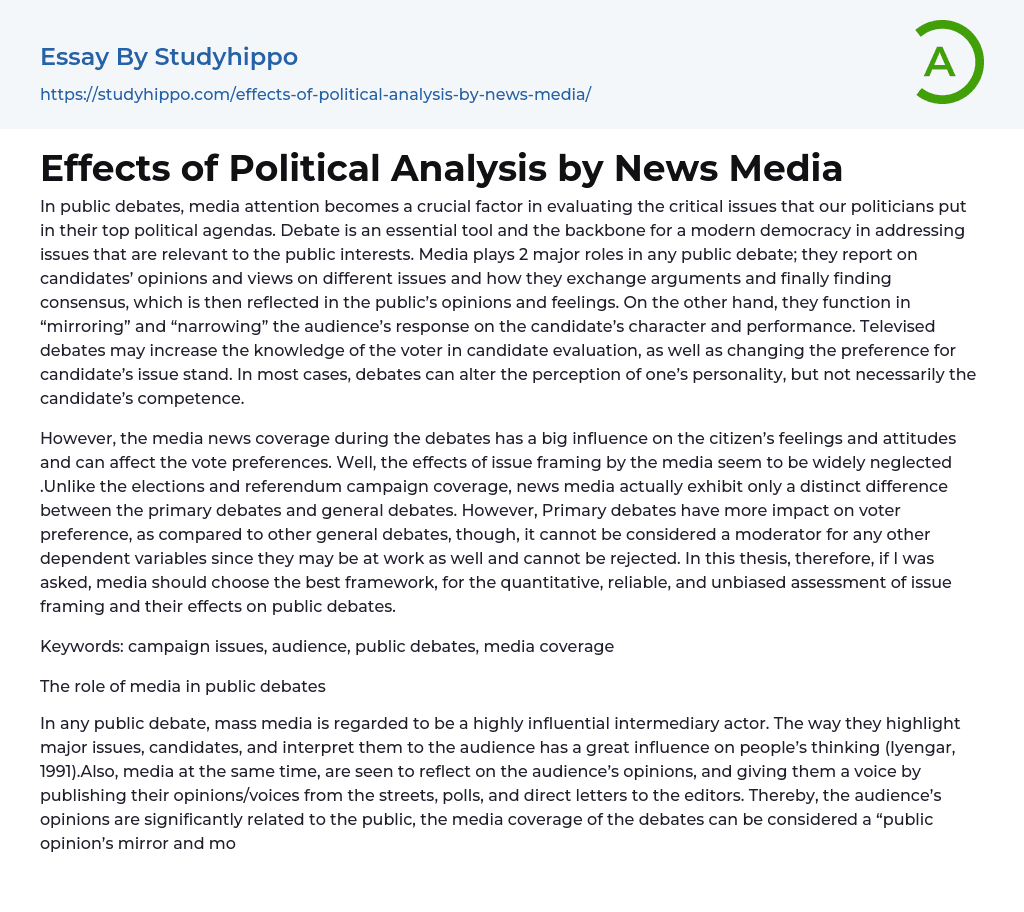

Effects of Political Analysis by News Media Essay Example
The media's crucial role in public debates involves evaluating the significant matters that politicians prioritize for our political agendas. These debates are essential to contemporary democracy as they address issues relevant to the public's interests.
The media has two main roles in public debates. One is to provide news reports on candidates' opinions, views on issues, and how they argue to reach consensus. These reports can sway the public's opinions and emotions. The other role of the media is to reflect the audience's response to a candidate's character and performance. Televised debates have the potential to improve voters' understanding of candidates and their positions on issues, which may influence their preference for one candidate over another. Although debates can sometimes alter perceptions of a candidate's personality, it may not necessarily impact their competence.
In this thesis, I argue that
...media news coverage plays a significant role in shaping the emotions, attitudes, and voting preferences of citizens during debates. Despite similarities between election and referendum campaigns, the impact of media's issue framing is often overlooked. However, primary debates and general debates are clearly differentiated by the media. Primary debates have a more substantial influence on voter preference when compared to general debates. It is important to consider other factors that may also be involved and should not be disregarded. Therefore, I believe it is crucial for the media to choose the best framework to quantitatively, reliably, and impartially evaluate the effects of issue framing on public debates.
Keywords: campaign issues, audience, public debates, media coverage
The role of media in public debates
Media plays an essential role in public debates, serving as a powerful intermediary.
They have a significant impact on people's perspectives by highlighting important issues and candidates and interpreting them for the audience. Media also reflect the opinions of the audience by disseminating their views through street interviews, polls, and letters to the editor. Thus, media coverage acts as both a mirror and a shaper of public opinion. This dual role has caused media to receive increased attention in ongoing debate coverage, particularly on topics like immigration, unemployment, and economic development that previously received less focus. However, permanent debates should allocate ample time to address various sub-issues and adopt a dynamic structure that can modify the emphasis on different candidates' policies. Accomplishing this necessitates an analysis of the media context.
Post-debate news can influence how viewers perceive a candidate's performance. The media often presents debates as a contest, declaring one candidate the winner and the other the loser. This portrayal shapes viewers' opinions of the candidate's character and overall performance. However, it is important to acknowledge that excessive and misguided media coverage can overshadow important campaign issues. In 2008, Brubaker and Jenner conducted a study examining how viewers perceived candidates after presidential debates. The findings revealed that many viewers changed their voting preference based on the candidate's performance and political stance.
These findings clearly demonstrate the understanding of viewer interaction with news coverage and post-debate, emphasizing the importance of focusing on credible sources of information.
Social influence on political judgments
Understanding an individual's knowledge and reactions to a public debate significantly influences other people's perception of a candidate's performance. The power of social context is evident in research, where different groups were involved. One group watched an edited version of the debate,
another group observed the reactions of fellow participants who followed the debate, and the last group witnessed live reactions from confederates as they watched the final debate. In all studies, there was a significant shift in audience judgment of performance. This highlights the strong influence of media context on candidate evaluation and supports the categorization of presidential debates as a fertile ground for informative media and its social influence (Kugler, Mathew, Political Psychology, April 2007, Vol.28, issue 2).
The impact of HDTV on people's perception of the public debate
Although there is ongoing debate about the effects of HDTV on public discourse, it is clear that high definition television (HDTV) is becoming more widespread and is greatly influencing how individuals perceive politicians. In a study conducted by Smarnic and Abbey C. Communication research reports in 2012, the effects of HD on people's perception were examined during the second presidential debate between Barack Obama and John McCain. The results indicated that the HD format negatively influenced viewers' perception of McCain, particularly in relation to his age. These findings can be attributed to the media's influence on politicians' strategies.
Conclusion
The conclusion of the text is that public debates play a crucial role in democracy, serving as a platform for exchanging arguments. It is important for the media to analyze these debates in a quantitative manner to ensure proper news delivery and avoid bias. Failure to do so can lead to violence or the evocation of different emotions among citizens. Moreover, individuals who frequently watch television place more importance on appearances during public debates compared to those who do not watch
at all. In other words, a candidate's appearance holds more significance in influencing the judgments and preferences of less informed voters.
References
- Boulianne, Shelley. "Social Media Use and Participation: A Meta-analysis of Current Research," Information, Communication & Society, 2015. doi: 10.1080/1369118X.2015.1008542.
- Papacharissi Z (2002) The virtual sphere. New Media and Society4(1): 9–27
- Sotirovic M and McLeod DM (2009) Media coverage of U.S. elections: Persistence of tradition. In: Stromback J and Kaid LL (eds) The Handbook of Election News Coverage around the World. New York: Routledge
- Collaboration essays
- Dialogue essays
- Fake News essays
- Journalism essays
- Mass Media essays
- Media Analysis essays
- Media Bias essays
- Media Studies essays
- Message essays
- News essays
- Propaganda essays
- Radio essays
- Rogerian Argument essays
- Role of Media essays
- Social Media essays
- Social Media Marketing essays
- Social Networking essays
- Youtube essays



